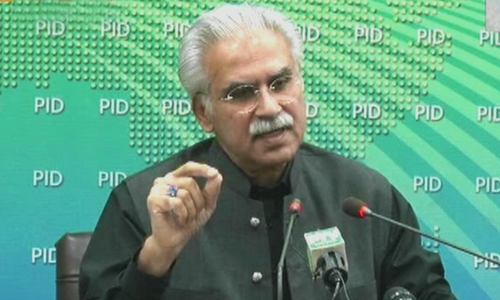ISLAMABAD: Dengue cases surpassed the previous record in the country amid improved surveillance and monitoring claims by officials.
At least 47 people have died and more than 30,000 have come down with the virus so far this year, according to official figures. But the disease is nowhere near as deadly as it was in 2011 when 370 people died.
According to a document available with Dawn, 30,098 is the number of confirmed dengue cases nationwide reported so far this year with the maximum number of cases reported from Islamabad i.e. 8,245 and the minimum number of cases from Balochistan which is 2,776. Punjab has so far reported 6,629, Khyber Pakhtunkhwa 5,229 and Sindh 5,190 cases. The remaining numbers are from Azad Jammu and Kashmir (AJK) and tribal districts.
As many as 17 persons have died because of dengue in Islamabad, 16 in Sindh, 10 in Punjab, three in Balochistan and one in AJK.
Disease at present is not as deadly as it was in 2011 when 370 died
Chief of Disease Surveillance Division at the National Institute of Health Dr Rana Safdar told Dawn that the increased number of dengue cases was due to improved surveillance and monitoring of the virus. "This time round there is unprecedented response in the history [of the country] to any outbreak. For the first time, the Emergency Operation Centre [EOC] has been activated at the National Institute of Health for dengue outbreak. Special Assistant to Prime Minister on Health Dr Zafar Mirza daily chairs a meeting at 8.30am to oversee the evolving situation," he said.
“Our statistics are much better compared to other countries but our task is not over. Based on our recent experience, we will develop a comprehensive multi-sectoral national action plan coordinating with provinces to defeat dengue in the next few years,” Dr Safdar added.
Globally dengue is one of the top 10 public health threats to the world according to the WHO, said Dr Safdar. “This year in the Philippines as many as 322,693 cases and 1,272 deaths have been reported, in Sri Lanka 234,078 cases and over 100 deaths, in Thailand 146,000 cases by 10th Sept, in Vietnam 124,751 cases by 26th Sept, in Malaysia 102,734 cases and 149 deaths by 26th Sept and in Bangladesh 100,000 cases with over 150 deaths have been reported,” he said.
The dengue virus is spread by the Aedes aegypti mosquito. The most common symptoms of dengue are high-grade fever accompanied by joint and muscular aches. There is no vaccine or specific treatment for dengue but early detection and proper medical care can lower mortality. Otherwise, the disease may turn into a life-threatening haemorrhagic fever, which in turn may lead to bleeding and dangerously low blood pressure.
Rapid and unplanned urbanisation, lack of sanitation and climate change are all contributing to a surge in dengue infections.
Published in Dawn, October 15th, 2019














































